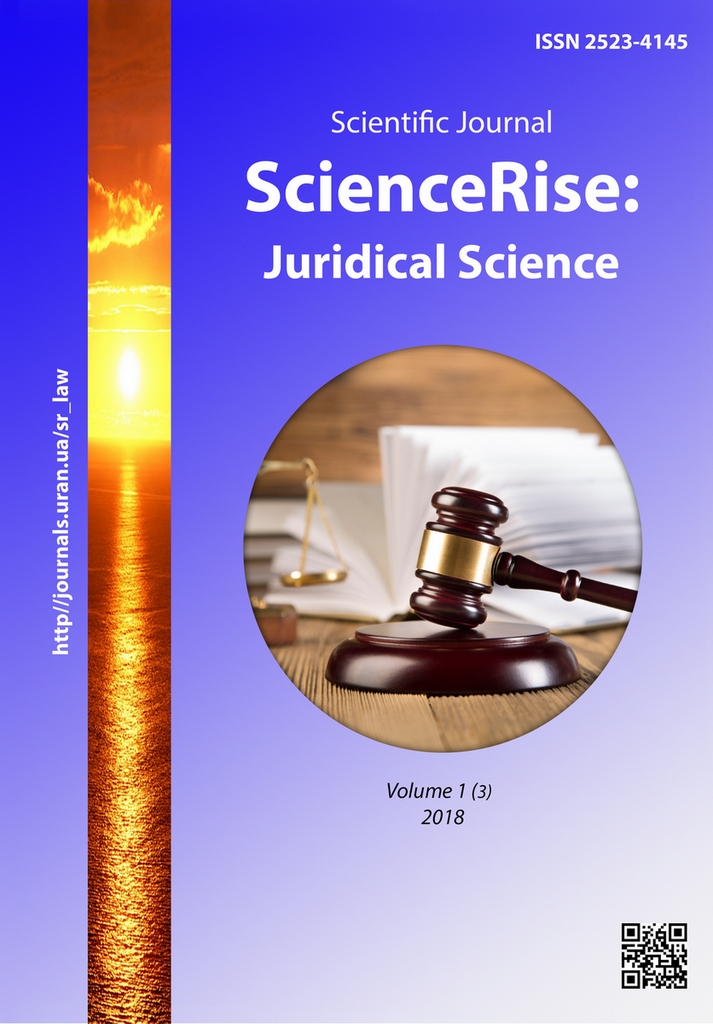"Legislation" as the legal term: to the problem of formulation of definition
DOI:
https://doi.org/10.15587/2523-4153.2018.127346Keywords:
legal term, legislation, normative legal act, international contract, system of normative legal actsAbstract
The concept of "legislation", which is one of the most frequently used in the texts of current normative legal acts, is analyzed in the article. "Legislation" as a common term means the totality (plurality) of legal laws; all the obligatory rules of behavior determined by the state. "Legislation" as a legal term doesn’t have the general single concept and the legal definition. The main problem of formulating the definition of the concept of legislation is its elemental composition, namely, the question of which normative legal acts (or possibly other official sources (forms) of law, for example, normative legal contracts) are included in it?
It is pointed that the rules of legislative technique requires a clear and single definition the legal term. It is stated that in determining the concept of "legislation" used logical method of enumerate. The author of the article proposes an approach to the formulation of the concept of "legislation" with the help of another logical operation - determination of the concept through the genus and species differences - defining a certain generic (primary) element, which is common to both the normative legal act and the normative legal agreement (or for all sources (forms) of the positive (legal) right)
References
- Ryndiuk, V. I. (2012). Problemy zakonodavchoi tekhniky v Ukraini: teoriya ta praktyka. Kyiv: Vyd-vo «Yurydychna dumka», 272.
- Busel, V. T. (Ed.) (2005). Velykyi tlumachnyi slovnyk suchasnoi ukrainskoi movy: 250000. Kyiv; Perun: Perun, 1728.
- Karaman, S. O., Karaman, O. V., Pliushch, M. Ya. et. al.; Karaman, S. O. (Ed.) (2011). Suchasna ukrainska literaturna mova. Kyiv: Litera LTD, 560.
- Shalyutin, B. S. (2007). Zakon i zakon (yur.). Gosudarstvo i pravo, 4, 79–83.
- Artykutsa, N. V. (2009). Zakonodavchi terminy ta yikh vyznachennia. Naukovi zapysky. Yurydychni nauky, 90, 39–44.
- Skakun, O. F. (2011). Teoriya prava i derzhavy. Kyiv: Alerta; TsUL, 520.
- Okrema dumka suddi Konstytutsiynoho Sudu Ukrainy Savenka M. D. u spravi za konstytutsiynym zvernenniam Kyivskoi miskoi rady profesiynykh spilok shchodo ofitsiynoho tlumachennia chastyny tretoi statti 21 Kodeksu zakoniv pro pratsiu Ukrainy (sprava pro tlumachennia termina «zakonodavstvo»). Ofitsiynyi veb-sait Konstytutsiynoho Sudu Ukrainy. Available at: http://www.ccu.gov.ua/docs/391
- Kravchenko, M. H. (2009). Poniattia ta elementy natsionalnoho zakonodavstva Ukrainy. Derzhava i pravo, 46, 46–52.
- Proekt Zakonu pro normatyvno-pravovi akty. No. 7409 vid 01.12.2010 r. Ofitsiynyi veb-portal Verkhovnoi Rady Ukrainy. Available at: http://w1.c1.rada.gov.ua/pls/zweb2/webproc4_1?pf3511=39123
- Khomiuk, N. S. (2014). Spivvidnoshennia poniattia systemy dzherel prava iz sumizhnymy poniattiamy. Porivnialno-analitychne pravo, 4, 36–38.
- Petryshyn, O. V., Pohrebniak, S. P., Smorodynskyi, V. S. et. al.; Petryshyn, O. V. (Ed.) (2015). Teoriya derzhavy i prava. Kharkiv: Pravo, 368.
- Shebanov, A. F. (1976). Sistema otrasley zakonodatel'stva: osnovaniya postroeniya. Pravovedenie, 4, 15–25.
- Voplenko, N. N. (2009). Ponyatie sistemy prava. Vestnik VolGU, 11, 11–16.
Downloads
Published
How to Cite
Issue
Section
License
Copyright (c) 2018 Vira Ryndiuk

This work is licensed under a Creative Commons Attribution 4.0 International License.
Our journal abides by the Creative Commons CC BY copyright rights and permissions for open access journals.
Authors, who are published in this journal, agree to the following conditions:
1. The authors reserve the right to authorship of the work and pass the first publication right of this work to the journal under the terms of a Creative Commons CC BY, which allows others to freely distribute the published research with the obligatory reference to the authors of the original work and the first publication of the work in this journal.
2. The authors have the right to conclude separate supplement agreements that relate to non-exclusive work distribution in the form in which it has been published by the journal (for example, to upload the work to the online storage of the journal or publish it as part of a monograph), provided that the reference to the first publication of the work in this journal is included.








